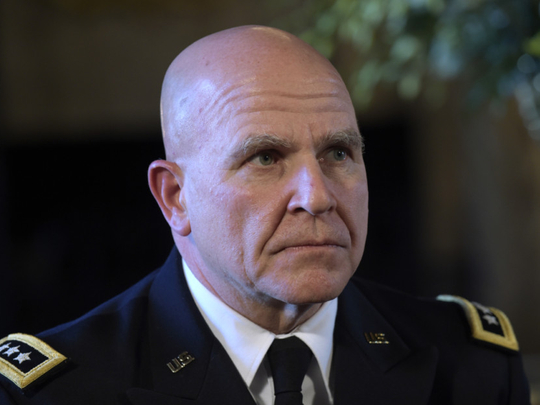
Monday’s appointment of Lt. General H.R. McMaster as the National Security Adviser of the United States, after President Donald Trump fired his predecessor, Michael Flynn, should augur at least a fleeting period of stability at the dysfunctional National Security Council. McMaster is a compelling choice: A scholar-warrior in the mould of Secretary of Defence James Mattis, with the bonus of looking every inch the part — allegedly a critical asset in the image-conscious Trump administration.
Yet, those very qualities could spell more trouble ahead. McMaster’s deep understanding of civil-military relations, and his reputation for not suffering fools, could quickly make him an irrepressible critic — and political enemy — of Trump and his senior adviser, Stephen Bannon.
McMaster, who is and will remain on active duty, is both a proven cavalry officer and a formidable defence intellectual, with a doctorate in History. His performance in combat at Tal Afar, Iraq, as commander of the Third Armoured Cavalry Regiment, is already studied as an exemplary application of counterinsurgency doctrine. In the 1991 Gulf War, he led a legendary tank assault that completely destroyed a much larger Iraqi force and earned him a Silver Star.
At the same time, McMaster has a cooler head than Flynn, or for that matter John Bolton, whom he beat out for the job. Although McMaster may place undue faith in robust military force and counterinsurgency, like Mattis he values stability. He most likely wouldn’t advocate anything pointlessly disruptive, like reversing (again) the “One China” policy, tearing up the Iran deal or barring Muslims. It’s a quality one would want in a national security crisis. Unfortunately, it’s also one that may put him on a collision course with the hotheads who occupy Trump’s inner circle.
Perhaps the best indication of McMaster’s thinking, and the likelihood of conflict with Bannon and others, is his 1997 book, Dereliction of Duty, a merciless, meticulous study of the early days of the Vietnam War, and how senior civilian officials and the joint chiefs-of-staff led the country into a quagmire.
His central thesis is that the joint chiefs became inordinately politicised, caving to senior civilian officials in the Johnson administration like McGeorge Bundy, the former national security adviser, who knew little about Vietnam, or military doctrine. Those officials were more concerned about appearing just strong enough not to lose hawkish domestic support without compromising the Great Society agenda than they were about actually winning the war. This yielded the tentative “graduated pressure” approach, rather than a decisive early concentration of military resources — especially combat ground troops.
“The war in Vietnam was not lost in the field nor was it lost on the front page of the New York Times or the college campuses,” he wrote. “It was lost in Washington,” even before “the first American units were deployed.”
In his book, and in the 20 years since its publication, McMaster has shown he is not afraid to find fault with presidents and other powerful officials. Former US president Lyndon B. Johnson and his senior advisers, he wrote, “rendered the administration incapable of dealing adequately with the complexities of the situation in Vietnam,” which prompted “arrogance, weakness and lying”.
For McMaster, the military must be able to forcefully assert its operational and strategic expertise in informing policy. The same holds for the intelligence and law enforcement communities.
Yet, Trump’s inclusion of Bannon on the Security Council’s Principals Committee last month, and the sidelining of the joint chiefs, gives the administration’s most senior voice on domestic policy a central role in national security decision-making — setting up the same scenario for disaster that McMaster examined in Dereliction of Duty.
We’ve already had a taste of the kinds of mistakes this arrangement will produce: The fumbled writing and rollout of Trump’s executive order on immigration and possibly the ill-fated raid in Yemen. An imbalance between political and operational considerations is precisely what McMaster abhorred about the Vietnam-era process. He derisively referred to the Vietnam-era joint chiefs as “the five silent men”.
Men like Bannon, of course, are not likely to be either silent or deferential. Instead, they will try to bureaucratically outflank dissenters. McMaster, for his part, vehemently objected to the way Johnson and secretary of defence Robert McNamara largely circumvented the Security Council’s interagency process in formulating and implementing Vietnam policy; it’s unlikely he’ll abide a similar move by Bannon and his circle. He’ll probably be joined by Mattis, who has emerged as an important counterweight on the council to Bannon.
Expect fireworks. McMaster’s unblinking, incisive criticism of national security officials reflects a conviction that they are duty bound to do all they can to avoid making or repeating historical mistakes — even at the risk of insubordination. At the same time, Trump does not take criticism well and lacks a sophisticated appreciation for operational nicety, policy deliberation or sound civil-military relations. He and Bannon are hostile to technocrats whose rigour and exactitude might impede their ideological agenda. And Trump, given his rhetoric, appears willing to indulge the use of military force with little regard for strategic consequences.
McMaster may well establish himself, with Mattis, as an effective stabilising force within the administration. Or he could find himself sidelined, or even ousted, if he brings too many inconvenient truths to the table. The drama would make for an entertaining piece of political theatre — if it didn’t involve the risk of a strategic disaster.
— New York Times News Service
Jonathan Stevenson is a senior fellow at the International Institute for Strategic Studies and a Cullman Centre Fellow at the New York Public Library. He was director for political-military affairs, Middle East and North Africa, at the National Security Council from 2011 to 2013.








